There is, most likely, someone in your life you are not being completely honest with. I say that because I was unaware that I lived a double life. I love honesty, but I was not always honest with myself. I kept commitments to others, but when it came time to put my own personal plans into action, there was always something else that seemed more important. Sometimes it was truly more important. But, other times, I was just fooling myself. I wanted to activate my good intentions, but I didn’t know how.
If you are like me, a high achiever, you are probably very good at meeting other people’s expectations. You might even voluntarily push yourself beyond expectations. You enjoy a good grade or appreciation by others. You like to make a difference. But the other side of the coin is that without that structure, without the expectations or appreciation of others, without a way to measure progress or success, it can be nearly impossible to optimally perform.
What is self-efficacy?
 According to Adler University, self-efficacy “coined by Albert Bandura is a person’s belief in his or her ability to complete a future task or solve a future problem. For example, if a person believes he is a brilliant scientist and can complete any scientific experiment, he has a high self-efficacy in science because he believes in his competency to perform a future experiment. Whether it is true that he is brilliant in science or not doesn’t really matter. It only matters what he believes.
According to Adler University, self-efficacy “coined by Albert Bandura is a person’s belief in his or her ability to complete a future task or solve a future problem. For example, if a person believes he is a brilliant scientist and can complete any scientific experiment, he has a high self-efficacy in science because he believes in his competency to perform a future experiment. Whether it is true that he is brilliant in science or not doesn’t really matter. It only matters what he believes.
Self-Efficacy can also influence your goals, actions, and successes (or failures) in life. If your self-efficacy in an area is much lower than your ability, you will never challenge yourself or improve. If your self-efficacy in an area is much higher than your ability, you will set goals that are too high, fail, and possibly quit. The ideal self-efficacy is slightly above a person’s ability: high enough to be challenging while still being realistic.”
Kill false expectations without killing yourself
Ever met someone who started an exercise program and then quit? What about a new mom who gets discouraged? Not including medical depression which I know is real, isn’t it normal to get overwhelmed and depressed by all we think we ought to be able to do?
The false expectations: “I ought to be able to keep up with the class that has been exercising for years” or “I ought to be able to get enough rest” can be especially disheartening when those things prove to be unrealistic. Unrealistic expectations hurt deeply if we mistakenly assume that our inability to immediately win says something about us personally.
Not meeting our own, seemingly low expectations feels like “you are a loser.” But what the failure is really saying is, “this was not a realistic expectation at this time.”
You are not a loser to want good things for yourself and others.
We can’t get better if we keep beating ourselves up mentally. I know part of my problem is that I am very impatient.
I wondered what I could do, other than set more realistic goals, to help myself keep those commitments that only I care about? This is what I found that I need:
Schedule: Limits are Critical
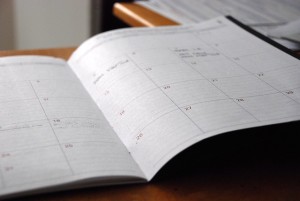 What is unexpectedly flying in and ruining plans? Is it really others? Or, am I sabotaging myself by over commitment or not planning? If I plan well and don’t over commit, am I actually doing my plan?
What is unexpectedly flying in and ruining plans? Is it really others? Or, am I sabotaging myself by over commitment or not planning? If I plan well and don’t over commit, am I actually doing my plan?
I have to use a schedule so that I know when I am most likely to get uninterrupted time and protect it. I know others can’t respect the time I need to be left alone if I don’t know I need that, or I haven’t communicated that need. One of the best ways I know to communicate this is by physical location. If I’m in the library with my phone off, most interruptions can’t find me. Some writers have a symbol (like a hat) that lets their family know that they need to be left alone unless it is an emergency. Since distractions by others is a primary problem for me, I have to set up a realistic way to have the environment I need to meet my goals even if it is less often than I would like.
I hate schedules! I guess you hate them, too, or you would have skipped this section because you already understand, love, and use schedules. But, I have always hated schedules because they are so frustrating. I am terrible at estimating how long things will take. I am always behind. Why would I want to use something to beat myself up more efficiently with?
I have learned to think of my schedule as a backup plan rather than a promise. Schedules work for me (instead of against me) when I make them very general with large time slots. They not only help me organize my day and week, they also help me focus. I can not be effective without focusing my attention and effort.
Even though I literally must run to answer emergency calls, and it feels frustrating to use a schedule at all, I find it very useful because when I get that precious, unexpected free time, I’m ready and know what to do with it so I don’t spend the whole time contemplating options and waste it. Keeping a schedule also helps me know when I need help or a sub so I can create those oasis moments of free time. Knowing that my other priorities are being well attended to, I am at peace to focus on my personal commitments as well.
Write it Down
I was sitting in church when the speaker said, “they failed to do ___ (very good thing) because they failed to write it down.” What a simple, necessary step. It was like he read my mind. I realized it was true. I had never put it in my calendar. I had never scheduled it. If I don’t write it down, it may never actually happen.
I have a friend that says, “the best memory is a short pencil.”
If I don’t want to forget, I must get it down on my to do list, calendar, or schedule.
Take Immediate Action
 Impulsive people get a bad reputation. They are talked badly about because they do things without thinking about their negative impact on others. But, look at what they do well. They don’t worry. They take action, not without thought, but immediately upon thought. I read that we have five seconds to use the activation energy that comes with a thought. If you think of something, you have five seconds to take action on that thought before you have less motivation. I know this is true for me.
Impulsive people get a bad reputation. They are talked badly about because they do things without thinking about their negative impact on others. But, look at what they do well. They don’t worry. They take action, not without thought, but immediately upon thought. I read that we have five seconds to use the activation energy that comes with a thought. If you think of something, you have five seconds to take action on that thought before you have less motivation. I know this is true for me.
What this means to me is: I can’t plan tomorrow tonight. I get all excited about what I’m going to do and then try to sleep on it?! Not a good recipe for sleep. I know people say plan your day at night but that really doesn’t work for me. I want to use that thought energy. I say, plan your day in the day.
It also means, if I see a sock on the floor, pick it up. I will have it where it goes in the amount of time it would take to write the task down. If we really have only five seconds to do something: let’s do it, write it down, or schedule it.
Or Not
I wonder if the reverse is true. I wonder if waiting at least five seconds would help impulsive people make better decisions. I know if I want to buy something really badly it does help me to go home without it. The few times I go all the way back again to pick it up, I don’t regret the purchase.
Appreciate Progress
I love finishing! It is great to check something off the list for good. I like to see it done. But, often when we follow the schedule, we have to interrupt ourselves before our work in one area is complete. I hate that! Why would anyone do that to themselves?
It is because of what we also want. We want more than one thing. Most of us have more than one responsibility. We have more than one task to do. Having only one mind, we must take turns focusing on our different roles and tasks.
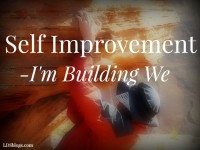
Self Improvement- To read more of DarEll’s articles, click here.
Yesterday I wanted to finish a playlist for my senior fitness class. I gave up everything else in my morning to get it done. I did get one done but because of technical problems could not get it on my player and could not use it in my class. I had to interrupt myself and go to class unprepared. I have to say, I wasn’t my most beautiful self. I felt cheated not to get that prize for crossing the finish line. But, I am much closer. My work wasn’t lost, and all my other priorities didn’t get neglected while I focused on that finish, one that really can wait. I have to appreciate progress.
If you really want to act on your good intentions,
start by making and keeping very small promises to yourself.
Then, don’t give up.
I’m cheering for you!
Namaste,
DarEll S. Hoskisson
About DarEll Hoskisson
DarEll S. Hoskisson loves to do hard things, but not too hard. She shares her own challenges, goals and experiences as she guides you into a realistic path of self-reflection and self-improvement. She shares tips on how to find, know and trust yourself so you can decide if other’s suggestions are right for you.
DarEll has the world a little upside down—where work is play and play is work. She actually thinks other people’s problems are fun to try to solve and lights up with a personal challenge. She loves people, harmony, and excellence. She also loves useful things like tools and ideas that make work faster, easier and more fun.
DarEll married in 1993 and graduated from BYU (1995) with a bachelor’s degree in English and Secondary Education. Since then she was adopted by 5 children and has worked with many non-profits. She is currently a certified personal trainer and group fitness instructor—leading pilates and yoga at her local YMCA.
DarEll lives in Florida where she enjoys her family, nature, her work, and encouraging people to live well.
She periodically posts her poems, what she is learning, and service opportunities on her personal blogs:
https://personalabridgements.wordpress.com and https://darellhoskisson.wordpress.com
Twitter •

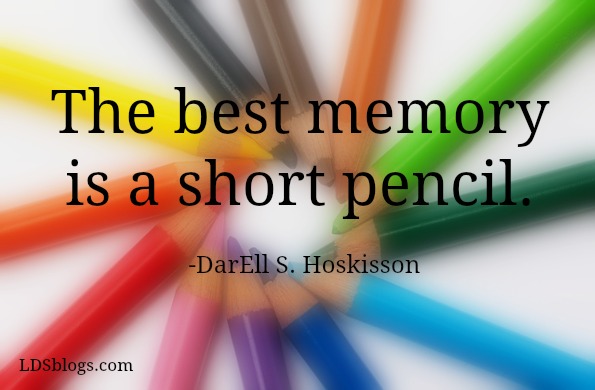

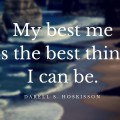
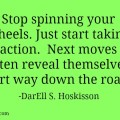


Don’t give up!
Be realistic!
Find what works for you!
Do it, write it down, or schedule it, or not! 🙂 Great suggestions!
If you want to ditch the pencil, you can try Trello. It is one of the few project management apps I’ve found that can go on computers and devices, has a free version, and has almost unlimited expansion and contraction capability. It is like a huge cork board with cards. You make lists of cards. Each card can have a list within it that shows a visual “thermometer” of percent complete to show progress. Plus, you can add a friend and easily share and both add onto it–like in Google Drive. You can move or copy cards without typing it again. You can even keep a victory list to keep track of completions and successes. I love it!
At your suggestion I tried Trello to keep track of what I was doing on my two parents life story books. It helped a lot. Thanks!